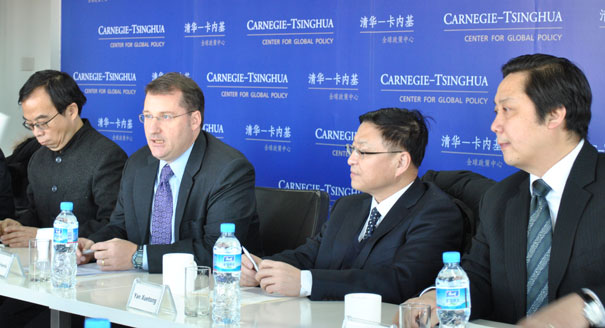Registration
You will receive an email confirming your registration.
IMGXYZ4251IMGZYXAs China continues to rise in global leadership, the question of what role China will take in the realm of global security—a catch-all term for nuclear proliferation, arms control, climate change, and energy—arises. Will China surpass the United States as the main provider of national security? What actions will China take in ensuring the regional security of the Asia-Pacific region?
Carnegie-Tsinghua’s Sun Xuefeng hosted experts from the American Enterprise Institute (AEI) for a discussion of the role of U.S.-Chinese cooperation in the Asia-Pacific. Issues addressed included China’s rise, the purported decline of the United States, and specific security issues such as North Korea and the South China Sea. Along with AEI experts, other Chinese and American scholars were present to weigh in on the discussion. Carnegie-Tsinghua’s Paul Haenle moderated.
The Changing Global Order
- United States in Decline?: The idea of the U.S. decline has become increasingly prominent in aftermath of the costly Iraq War and global financial crisis, said a participant. U.S. citizens are less concerned with non-traditional security threats and issues outside of direct U.S. interests. The United States no longer has the global power and influence it once enjoyed, and many believe that it will no longer be able to maintain its hegemony in the coming years. For this reason, one American scholar asserted that U.S. leaders wish to see China take on more global responsibility.
- China’s Ascent: China continues to reassure the international community, particularly the United States, that it has no intention of becoming a global leader, said a discussant. Despite steady economic growth, China is still at least a decade away from becoming the leading world economy. According to Carnegie-Tsinghua’s Yan Xuetong, China is not prepared to become a global leader, nor does it have any intention of doing so. Should the United States fail to provide global security in the future, China will not see a power vacuum, but rather anticipate a power shift to the Asia region in the absence of U.S. hegemony.
Regional Security Concerns
- North Korea: China and the United States have the opportunity to enhance cooperation over North Korea, as both nations have similar strategic objectives regarding the Korean peninsula, said a participant. None of the members of the six-party talks want North Korea to obtain nuclear weapons or conflict to arise between the north and south. However, another participant said, the current priorities of the two differ and with the coming leadership changes in both China and the United States, the future of policy cooperation is ambiguous.
- South China Seas: One controversy between the United States and China regarding the South China Sea is that the United States potentially regards China’s aggression as a sign that China wishes to increase military and naval prominence in the region, said a discussant. While the United States wishes to maintain freedom of navigation and open sea lanes, China is more concerned with the military symbolism of the region. China lacks a unified stance on the issue, added another participant, and a lack of support by legal scholars within the internal debate may hinder China’s ability to negotiate with other nations in the region.
The Future of U.S.-China Cooperation
With the possibility that the United States will no longer be able to unilaterally provide global security, China must decide how it would proceed. Cooperation between China and the United States on regional as well as global issues will be necessary. Yan explained that the rise of China will be a positive development for global economic and security concerns, but that China is currently unprepared to take on a more responsible role. While China and the United States are both heavily dependent on one another economically, there is no foundation of mutual trust, concluded the discussants. This problem needs to be remedied in order to build further cooperation and understanding.
Discussants: Arthur Brooks, Tully M. Friedman, Daniel D’Aniello, Sun Zhe, Jin Canrong, Huang Ping.
